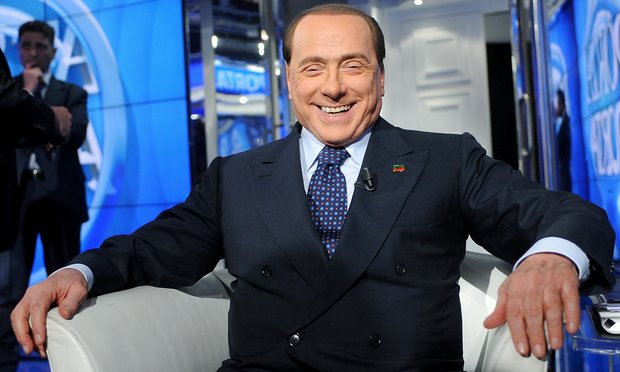We’ve Seen Donald Trump before – His Name Was Silvio Berlusconi
SPECIAL FEATURE, 14 Nov 2016
Be warned: Italy’s former prime minster promised the world and disdained the truth – and became his country’s third longest-serving leader.

‘The lesson for America is that for far too long Berlusconi was treated as a joke and a clown. By the end, nobody was laughing.’
Photograph: Mari/Sintesi/SIPA/REX
20 Oct 2016 – We keep being told that the Donald Trump phenomenon means we have entered the era of post-fact politics. Yet, I would argue, post-fact politics has been tarnishing democracy for some time. Twenty-two years ago a successful businessman sent a VHS tape to Italy’s news channels. It showed him sitting in a (fake) office. He read a pre-prepared statement via an autocue.
The man’s name was Silvio Berlusconi, and he was announcing that he was, in his words, “taking the field”. The first reaction was derision. Opposition politicians saw his political project (the formation of a “movement” called Forza Italia – Go for it, Italy – just months ahead of a crucial general election) as a joke. Some claimed a stocking had been put over the camera to soften the impact of Berlusconi’s face.
But Forza Italia soon became the biggest “party”. In the working-class Communist citadel of Mirafiori Sud in Turin, an unknown psychiatrist standing for Berlusconi’s movement beat a long-standing trade unionist. Berlusconi had not just won, he had also stolen the left’s clothes and some of its supporters. That first government was short lived, but Berlusconi would dominate Italian politics for the next 20 years – winning elections in 2001 and 2008 and losing by a handful of seats in 2006. In terms of days in office, Berlusconi ranks as Italy’s third longest-serving prime minister, behind Mussolini and the great liberal of 19th-century Italy, Giovanni Giolitti.
The parallels between Berlusconi and Trump are striking. Both are successful businessman who struggle with “murky” aspects linked to their companies – tax, accounting, offshore companies. Berlusconi was convicted of tax fraud in 2013, which effectively put an end to his political career. But business success and huge wealth was part of his political appeal, as they are for Trump. Beyond wealth, Berlusconi, like Trump, always painted himself as an outsider, as anti-establishment, even when he was prime minister. And, like Trump, Berlusconi’s appeal was populist and linked to his individual “personality”.
Berlusconi’s personal-business political model has since been followed by others in Italy. It could be argued that both Beppe Grillo’s populist anti-political Five Star Movement and Matteo Renzi’s insider-outsider appeal (until recently) have been created very much in Berlusconi’s image. One could go so far as to say Berlusconi transformed politics. The mass parties of the postwar period had become increasingly irrelevant, but he didn’t need a party just as Trump doesn’t really need the Republican party.

‘Like Donald Trump, Berlusconi’s appeal was populist and linked to his individual “personality”.’ Photograph: Xinhua/REX/Shutterstock
So-called gaffes were a frequent part of Berlusconi’s political strategy – a dog-whistle strategy that included frequent recourse to sexist, homophobic and racist stereotypes, and reference to his belief that he was irresistible to women. He flaunted his Don Giovanni image, but also attempted to keep a parallel reputation as a family man, whose main concern was the welfare of his five children.
His electoral campaigns were all about him. Nothing else mattered. He dominated the agenda from start to finish. When the former mayor of Rome Walter Veltroni tried to run a campaign against Berlusconi by not mentioning Berlusconi, he was heavily defeated. Silvio’s “gaffes” would usually be followed by claims that he had been “misunderstood” or was the victim of a “hostile media”. He was also reluctant to accept the verdict of the electorate as final when he lost. He would make frequent (and unsubstantiated) claims of electoral fraud and ballot-stuffing. Remind you of anyone?
He also created a set of enemies against which he could mobilise his followers: the judiciary, the media (despite owning much of it), politics itself, Communism, women (he often commented on the appearance of female opponents) and the EU and the euro. He presented himself as a victim of political correctness gone mad, an ordinary/extraordinary man speaking his mind. He promised the world, and it mattered little if he was quickly proved wrong, or had no intention of fulfilling any of his promises. Berlusconi knew that many of the electorate had short memories indeed.

‘Berlusconi’s scandals had little effect on his support’: the former prime minister was convicted but on appeal found not guilty of paying prostitute Karima El Mahroug for sex when she was under 18.
Photograph: Giuseppe Aresu/AFP/Getty Images
And as with Trump (at least until the “locker-room” video), Berlusconi’s scandals had little effect on his support. The numerous trials and journalistic scoops regarding Berlusconi’s private and business lives often seemed merely to reinforce his appeal. The message sent out was, for many, an attractive one. Be like me. Don’t pay taxes. Enjoy life and make money. Say what you want. We won’t bother you.
He became so powerful at one stage that he even tried to make himself immune to prosecution, through a law passed by his own government. Luckily, Italy’s constitution forbade such a monstrosity. But the fact that it was even contemplated was worrying. Mass opposition to Berlusconi rose and fell at various times, and many took to the streets to protest. Yet his appeal also had roots deep in Italian society – and in a hatred of politics and politicians that has since moved onto other forms of populism.
The Berlusconi phenomenon shows that a post-truth politician can rise to power in one of the world’s strongest and richest countries. The lesson for America is that for far too long Berlusconi was treated as a joke and a clown. By the end, nobody was laughing. Twenty years of Berlusconi at the centre of the system had a deeply damaging impact on Italy’s body politic and democratic culture and the wounds are by no means healed. Win or lose, Trump has shifted the terms of political discourse, campaigning and organisation. As with the Berlusconi era, things will never be the same again.
__________________________________________
John Foot is a professor of modern Italian history at Bristol University. His books include Calcio-A History of Italian Football (Harper, 2007).
Go to Original – theguardian.com
DISCLAIMER: The statements, views and opinions expressed in pieces republished here are solely those of the authors and do not necessarily represent those of TMS. In accordance with title 17 U.S.C. section 107, this material is distributed without profit to those who have expressed a prior interest in receiving the included information for research and educational purposes. TMS has no affiliation whatsoever with the originator of this article nor is TMS endorsed or sponsored by the originator. “GO TO ORIGINAL” links are provided as a convenience to our readers and allow for verification of authenticity. However, as originating pages are often updated by their originating host sites, the versions posted may not match the versions our readers view when clicking the “GO TO ORIGINAL” links. This site contains copyrighted material the use of which has not always been specifically authorized by the copyright owner. We are making such material available in our efforts to advance understanding of environmental, political, human rights, economic, democracy, scientific, and social justice issues, etc. We believe this constitutes a ‘fair use’ of any such copyrighted material as provided for in section 107 of the US Copyright Law. In accordance with Title 17 U.S.C. Section 107, the material on this site is distributed without profit to those who have expressed a prior interest in receiving the included information for research and educational purposes. For more information go to: http://www.law.cornell.edu/uscode/17/107.shtml. If you wish to use copyrighted material from this site for purposes of your own that go beyond ‘fair use’, you must obtain permission from the copyright owner.